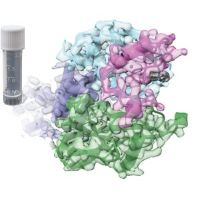Specification
| Description | Recombinant protein from the full-length sequence of Homo sapiens solute carrier family 3 member 2 (SLC3A2), transcript variant 3 (NM_002394). |
| Organism | Homo sapiens (Human) |
| Expression Host | Human Cells |
| Tag Info | His or DYKDDDDK. Please contact us if you need further information or require specific designed tag. |
| Purity | Greater than 90% by SDS-PAGE gel |
| Uniprot ID | P08195 |
| Entry Name | 4F2_HUMAN |
| Gene Names | SLC3A2 MDU1 |
| Alternative Gene Names | MDU1 |
| Alternative Protein Names | 4F2 cell-surface antigen heavy chain (4F2hc) (4F2 heavy chain antigen) (Lymphocyte activation antigen 4F2 large subunit) (Solute carrier family 3 member 2) (CD antigen CD98) |
| Application | Antigens, Western, ELISA and other in vitro binding or in vivo functional assays, and protein-protein interaction studies; For research & development use only! |
| Buffer | Purified protein formulated in a sterile solution of PBS buffer, pH7.2, without any preservatives |
| Endotoxin | Endotoxin level is < 0.1 ng/µg of protein (<1EU /µg) |
| Length | 630 |
| Molecular Weight(Da) | 67994 |
| Protein Sequence | (The sequence of expressed protein may have some variation from the sequence shown below. Please contact us for the exact sequence.) MELQPPEASIAVVSIPRQLPGSHSEAGVQGLSAGDDSELGSHCVAQTGLELLASGDPLPSASQNAEMIETGSDCVTQAGLQLLASSDPPALASKNAEVTGTMSQDTEVDMKEVELNELEPEKQPMNAASGAAMSLAGAEKNGLVKIKVAEDEAEAAAAAKFTGLSKEELLKVAGSPGWVRTRWALLLLFWLGWLGMLAGAVVIIVRAPRCRELPAQKWWHTGALYRIGDLQAFQGHGAGNLAGLKGRLDYLSSLKVKGLVLGPIHKNQKDDVAQTDLLQIDPNFGSKEDFDSLLQSAKKKSIRVILDLTPNYRGENSWFSTQVDTVATKVKDALEFWLQAGVDGFQVRDIENLKDASSFLAEWQNITKGFSEDRLLIAGTNSSDLQQILSLLESNKDLLLTSSYLSDSGSTGEHTKSLVTQYLNATGNRWCSWSLSQARLLTSFLPAQLLRLYQLMLFTLPGTPVFSYGDEIGLDAAALPGQPMEAPVMLWDESSFPDIPGAVSANMTVKGQSEDPGSLLSLFRRLSDQRSKERSLLHGDFHAFSAGPGLFSYIRHWDQNERFLVVLNFGDVGLSAGLQASDLPASASLPAKADLLLSTQPGREEGSPLELERLKLEPHEGLLLRFPYAA |
Background
| Function | FUNCTION: Component of several heterodimeric complexes involved in amino acid transport (PubMed:11557028, PubMed:9829974, PubMed:9751058, PubMed:10391915, PubMed:10574970, PubMed:11311135, PubMed:30341327). The precise substrate specificity depends on the other subunit in the heterodimer (PubMed:9829974, PubMed:9751058, PubMed:10391915, PubMed:10574970, PubMed:30867591, PubMed:10903140). The complexes function as amino acid exchangers (PubMed:11557028, PubMed:10903140, PubMed:12117417, PubMed:12225859, PubMed:30867591). The homodimer functions as sodium-independent, high-affinity transporter that mediates uptake of large neutral amino acids such as phenylalanine, tyrosine, L-DOPA, leucine, histidine, methionine and tryptophan (PubMed:9751058, PubMed:11557028, PubMed:11311135, PubMed:11564694, PubMed:12117417, PubMed:12225859, PubMed:25998567, PubMed:30867591). The heterodimer formed by SLC3A2 and SLC7A6 or SLC3A2 and SLC7A7 mediates the uptake of dibasic amino acids (PubMed:9829974, PubMed:10903140). The heterodimer with SLC7A5/LAT1 mediates the transport of thyroid hormones triiodothyronine (T3) and thyroxine (T4) across the cell membrane (PubMed:11564694, PubMed:12225859). The heterodimer with SLC7A5/LAT1 is involved in the uptake of toxic methylmercury (MeHg) when administered as the L-cysteine or D,L-homocysteine complexes (PubMed:12117417). The heterodimer with SLC7A5/LAT1 is involved in the uptake of leucine (PubMed:25998567, PubMed:30341327). When associated with LAPTM4B, the heterodimer with SLC7A5/LAT1 is recruited to lysosomes to promote leucine uptake into these organelles, and thereby mediates mTORC1 activation (PubMed:25998567). The heterodimer with SLC7A5/LAT1 may play a role in the transport of L-DOPA across the blood-brain barrier (By similarity). The heterodimer formed by SLC3A2 and SLC7A5/LAT1 or SLC3A2 and SLC7A8/LAT2 is involved in the cellular activity of small molecular weight nitrosothiols, via the stereoselective transport of L-nitrosocysteine (L-CNSO) across the transmembrane (PubMed:15769744). Together with ICAM1, regulates the transport activity of SLC7A8/LAT2 in polarized intestinal cells by generating and delivering intracellular signals (PubMed:12716892). Required for targeting of SLC7A5/LAT1 and SLC7A8/LAT2 to the plasma membrane and for channel activity (PubMed:9751058, PubMed:11311135, PubMed:30867591). Plays a role in nitric oxide synthesis in human umbilical vein endothelial cells (HUVECs) via transport of L-arginine (PubMed:14603368). May mediate blood-to-retina L-leucine transport across the inner blood-retinal barrier (By similarity). {ECO:0000250|UniProtKB:P10852, ECO:0000250|UniProtKB:Q794F9, ECO:0000269|PubMed:10391915, ECO:0000269|PubMed:10574970, ECO:0000269|PubMed:10903140, ECO:0000269|PubMed:11311135, ECO:0000269|PubMed:11389679, ECO:0000269|PubMed:11557028, ECO:0000269|PubMed:11564694, ECO:0000269|PubMed:11742812, ECO:0000269|PubMed:12117417, ECO:0000269|PubMed:12225859, ECO:0000269|PubMed:12716892, ECO:0000269|PubMed:14603368, ECO:0000269|PubMed:15769744, ECO:0000269|PubMed:15980244, ECO:0000269|PubMed:25998567, ECO:0000269|PubMed:30341327, ECO:0000269|PubMed:30867591, ECO:0000269|PubMed:9751058, ECO:0000269|PubMed:9829974, ECO:0000269|PubMed:9878049}.; FUNCTION: (Microbial infection) In case of hepatitis C virus/HCV infection, the complex formed by SLC3A2 and SLC7A5/LAT1 plays a role in HCV propagation by facilitating viral entry into host cell and increasing L-leucine uptake-mediated mTORC1 signaling activation, thereby contributing to HCV-mediated pathogenesis. {ECO:0000269|PubMed:30341327}. |
| Pathway | |
| Protein Families | SLC3A transporter family |
| Tissue Specificity | Expressed ubiquitously in all tissues tested with highest levels detected in kidney, placenta and testis and weakest level in thymus. During gestation, expression in the placenta was significantly stronger at full-term than at the mid-trimester stage. Expressed in HUVECS and at low levels in resting peripheral blood T-lymphocytes and quiescent fibroblasts. Also expressed in fetal liver and in the astrocytic process of primary astrocytic gliomas. Expressed in retinal endothelial cells and in the intestinal epithelial cell line C2BBe1. {ECO:0000269|PubMed:11389679, ECO:0000269|PubMed:11557028, ECO:0000269|PubMed:11742812, ECO:0000269|PubMed:12716892, ECO:0000269|PubMed:14603368, ECO:0000269|PubMed:15980244, ECO:0000269|PubMed:16496379, ECO:0000269|PubMed:3265470, ECO:0000269|PubMed:3480538}. |
QC Data
| Note | Please contact us for QC Data |
| Product Image (Reference Only) |  |

